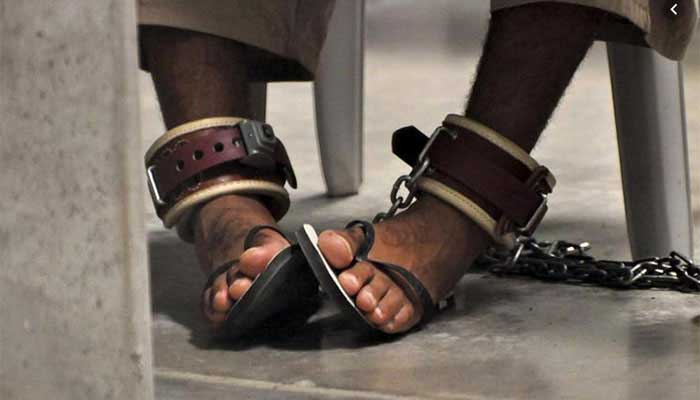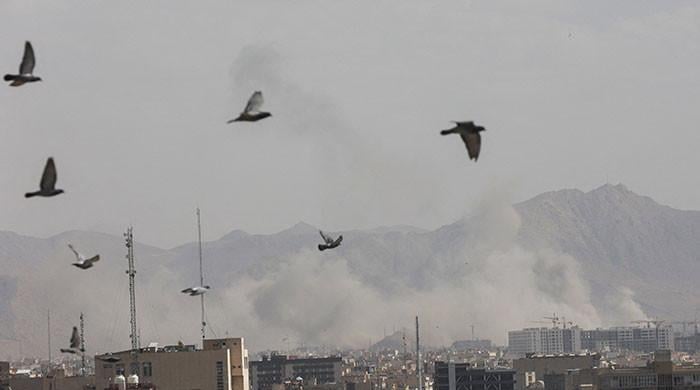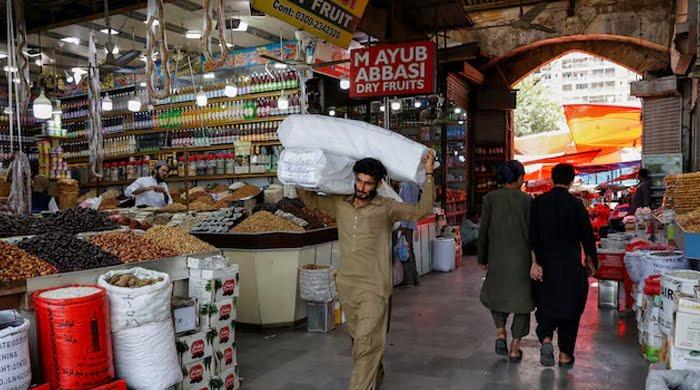Torture and death in police custody: Where is the law to protect us?
Over the years, there have been efforts to criminalise custodial torture in Pakistan, but to no avail
June 24, 2020

Imagine being thrown into the back of a vehicle, transported to a completely unknown location and tortured by people you don’t know, for reasons they won’t tell you.
Imagine them forcing you to confess to a crime you didn’t commit. Imagine them threatening your elderly parents with fabricated cases and similar torture if you do not confess. Imagine being imprisoned for decades with no one to listen, believe or care about what happened to you.
June 26 is the International Day in Support of Victims of Torture, as appropriate a day as any to imagine these horrors that are inflicted upon the men and women of our country every day at the hands of law enforcement agencies.
After more than two decades on death row in prison, Muhammad Iqbal’s sentence was finally commuted to life imprisonment earlier this month by the Lahore High Court. In 1998, at the age of 17, he was picked up by the police and tortured for several days. Finally, under extreme duress and after threats were made to arrest and torture his father, the police extracted a false confession from Iqbal. Tried and sentenced as a juvenile the following year, he spent nearly 20 years on death row. Two decades of his life lost.
This is the reality that Muhammad Iqbal and innumerable others have been victim to for decades. Currently, there is no specific law in Pakistan that criminalises custodial torture, meaning that our policemen are given the right to act with impunity. Because of this, countless people fall, and are pushed through the cracks in our criminal justice system, unnoticed and uncared for.
Over the years, there have been efforts to criminalise custodial torture in Pakistan, but to no avail. Even when passed in the Senate, bills regarding torture and police custody have languished in the National Assembly for months, passing deadlines for legislative approval due to delays in the convening of the house and other reasons.
In February 2020, Senator Sherry Rehman tabled the Torture and Custodial Death (Prevention and Punishment) Act, 2020. The goal of the bill is to define torture and its different uses in Pakistan while aligning domestic law with the UN Convention against Torture and other Cruel, Inhuman or Degrading Treatment or Punishment (UNCAT), which Pakistan ratified in 2010.
The bill proposes jail terms and fines for public servants responsible for custodial torture, death and sexual violence, with a fine of Rs2 million along with a maximum 10-year sentence for custodial torture and a fine of Rs3 million along with a life imprisonment sentence for custodial death and sexual violence.
According to research by Justice Project Pakistan, torture in police custody has been normalised to the extent that most involved in the criminal justice system accept it as an inevitable and even routine part of a criminal investigation. Police officials use both physical and psychological torture to torment people, and those most susceptible to police torture are usually from marginalised sections of society, including daily-wage workers and domestic workers.
These working-class citizens do not have the financial or political backing that allows richer and elite members of society to be free of the terrors of police brutality.
Examples of violence used include severe beatings, hanging victims from the legs and arms and stripping them naked to humiliate them. Victims are threatened, intimidated and forced to witness the torture of others. Gender-based violence is also evident in reports of police torture, with accounts of female victims being subjected to rape, sexual assault and humiliation.
While rarely punished for such cases, police officers under fire manage to invent convoluted and baffling ways to escape any possible consequences of their actions.
Facing an FIR for the killing of a man during a fake encounter in police custody, one policeman in Faisalabad married the wife of his victim and convinced her to withdraw all charges against him. Those who cannot be co-opted or bought are harassed into co-operation. Our current system even works to reward and protect police officials involved in torture and police brutality; with accounts of promoting officers with a penchant for brutality and officers even being sent abroad to avoid punishment.
Rao Anwar, who is known for the torture and extrajudicial killing of Naqeebullah Mehsud and at least 443 others, was arrested after months of thwarting the very authorities he worked for. Arrested in March 2018, Anwar has also been accused of torturing victims in safe houses, yet, he was granted bail by an Anti-Terrorism Court in June of the same year. While he was denied post-arrest bail earlier this month in Karachi, reports on his current whereabouts are vague and seem to be intentionally shrouded in confusion.
Some may remember the viral video of Salahuddin Ayubi, a young man stealing money from an ATM and sticking his tongue out cheekily at the CCTV camera. In September 2019, he was tortured to death in police custody and pronounced dead on arrival at the hospital in Rahim Yar Khan.
He had his name and address tattooed on his arm and was clearly mentally ill. How unfortunate that our news and media cycle through cases like this on a permanent basis, with incidents of torture and deaths in police custody making headlines for a few days, soon to be forgotten, replaced and buried under new headlines telling the same old story.
The International Day in Support of Victims of Torture is an opportunity to reiterate the need to establish an independent and external mechanism to investigate incidences and perpetrators of torture and address the grievances of victims.
Pakistan has failed the victims of torture for too long and while the countless lives lost cannot be replaced, we can build a safer country for citizens by passing crucial legislation to increase transparency and accountability.
Kazmi is a criminologist interested in international security, gender-based violence and women’s rights.











